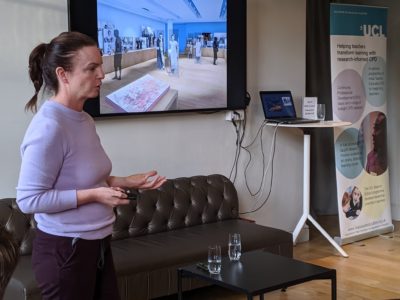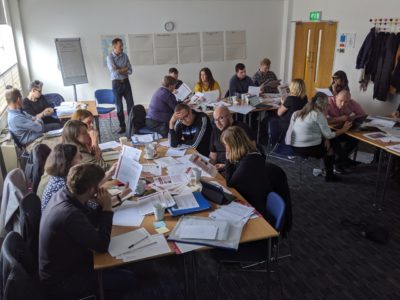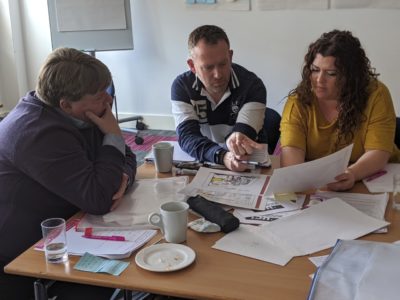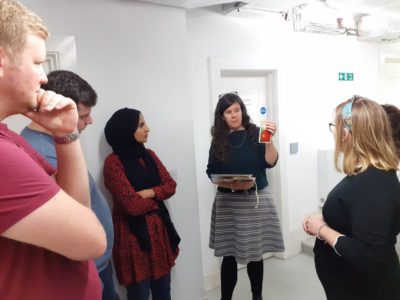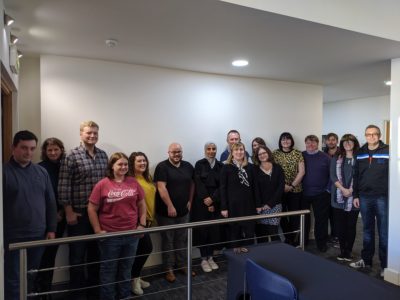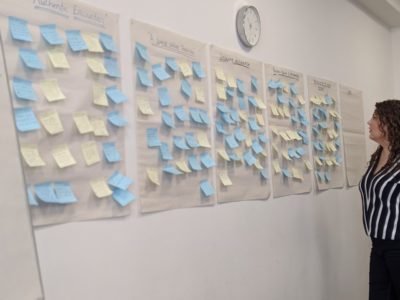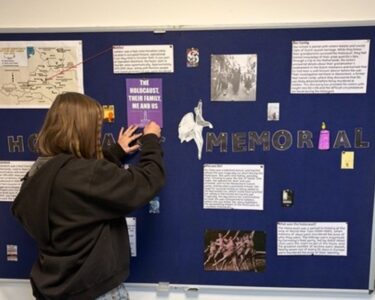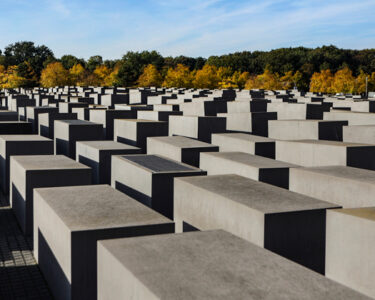- Find out more about becoming a UCL Beacon School here
- Follow @UCL_Holocaust #BeaconSchool1920 for updates throughout the Beacon School year and for news on the 2020-21 Beacon School application process
The UCL Beacon School residential programme, for our 2019-20 cohort of schools across England, took place this week in Central London. It was an intense, but wonderful 4 days and we’re proud and excited to be working with this inspiring group of schools over the coming year.
Professor Stuart Foster, Executive Director of the Centre for Holocaust Education said:
“It has been a privilege to engage with an exceptional group of inspirational teachers who have devoted 4 days of their precious time to attend our research-informed Beacon School Residential in London – some giving up part of their half term! To see these highly committed teachers, often working in incredibly challenging and specialist contexts, engaging, wrestling and collaborating with Centre staff in order to address the challenges, improve the provision for an experience of quality teaching and learning about the Holocaust was so impressive, truly inspiring. The quality of debate and discussion has been excellent, and everyone is thoughtfully considering the practical classroom implications of UCL research. Rest assured, our students’ education is safe in the hands of these outstanding educators!”
On Friday 18th October, the 16 schools’ lead teachers met with UCL Centre colleagues at the Imperial War Museum for our opening event, which included a visit to their permanent Holocaust exhibition. Our cohort then had a rather unique opportunity to engage with Rachel Donnelly, the Holocaust Learning Manager and Learning and Audience Advocate for the Holocaust Galleries, who shared the latest news on the IWM exhibition developments. The privileged ‘sneak-peek’ and Rachel’s insights regards exhibition curation resonated strongly with developing classroom pedagogy and schemes of work. This metaphor would remain a powerful motif, reflected upon again and again throughout the residential. We would like to take this opportunity to thank our long-term partners, the IWM, and in particular, Rachel, for setting up the context of our residential so powerfully for our teachers and enabling us to visit your important and impressive exhibition.
After the IWM visit, Lead Teachers remained in London, working intensively with Centre colleagues over the following days, through a series of workshops, exploring key research informed pedagogy, listening and exploring best practice thanks to sharing the ‘collective wisdom’ of the room via our ‘Working Wall’.
We were delighted to welcome Beacon School alumni, Matt Jones from Woking High School who shared his story, outlined the impact of the programme on his practice and on the whole school. He went on to explain the Centre’s Quality Mark process – and we were delighted to be joined by alumni Samantha Hunt from Sandhurst School who shared her citizenship focused Beacon School journey and inspired the cohort with the connections forged from Holocaust education to genocide prevention. We are always keen to highlight and champion our alumni experiences with the current cohort – they inform, inspire, engage and empower our teachers, they demonstrate what might be possible, and illustrate the importance of a scheme and approach to Holocaust education that is bespoke to individual school context and responsive to student need. Matt reflected after his presentation: ‘It was great to see everyone yesterday – I am always blown away by the welcome I receive and am genuinely happy to help out in any way that I can to repay the faith shown in me all those years ago!’
Whilst Sam commented: “It is a true privilege to be involved with the Beacon School programme. I meant it when I said it is, without doubt, the best Holocaust education course I have ever been on. As a non-academic I am in awe of the work you all do at the centre and the fantastic resources you have provided for teachers. They are second to none. It was a pleasure to come to the programme yesterday and I was very pleased to be invited.”
On Monday the cohort spent a fascinating morning with our friends at the Wiener Library. Again, our teachers were honoured to take a ‘peek behind the curtain’ to explore the archives and understand the rich and important resource the Library provides. Here too, was the ideal location for our teachers to explore our ‘British responses to the Holocaust’ session – featuring as it does, evidence and case studies from the Wiener collection. Thankyou Dr Simpson and colleagues for your warm welcome and playing such gracious hosts.
Reflections from the lead teachers who took part this week included…
“Inspirational and moving CPD”
“Brilliant pedagogy and engaging approaches – made me rethink my questioning – for learning. Truly energised, feeling inspired and empowered. #InspiringGenericT&L”
“The sessions were absolutely brilliant and extremely well planned with superb resources. All of them opened up new areas for my scheme of work. I felt wonderfully challenged (in a good way!) and supported in all of them.”
“The “A Space Called Treblinka” session made me see the Holocaust in a new light – not always industrial, sometimes a frenzy. Really complicated my thinking and gave me a new regard for maps, for embracing dissonance, for relishing challenge and complexity in my teaching.”
“My knowledge and understanding of the Holocaust has increased immeasurably and I am very grateful for the opportunities provided in terms of visits to the Imperial War Museum and the Wiener Library.”
“Really feels like we are part of a change, using the most cutting-edge resources. Whole weekend has seen us engage with up to date examples, current research, stats and case studies. To be part of that, feels really special and I feel honoured to be part of it and a real sense of duty to honour your investment in me and my school.”
“In terms of pedagogy, the methods you demonstrated will enable me to move my own teaching on, and I will start to impart them to my colleagues too.”
“Your powerful messages regarding combating antisemitism and the importance of remembrance were truly inspiring, and ones which I aim to pass on to my students.”
“
“‘Simply put, the best thing I have ever done in my teaching career – professionally and personally life changing.””
“It’s SO much more than a Holocaust T&L course! Its been about safeguarding, policy, citizenship and what it means for us to be both professional educators and human beings. Its reinvigorated me, given me purpose and will significantly change my classroom practice in every area…This is just so need in my context and I am keen to begin the hard work to challenge fake news, the right, left and enhance or citizenship and safeguarding provision. I know now how to make the Holocaust relevant to 2019, my community and my learners… I’ve learned so much from the team, but also my cohort peers – thankyou all.”
“I would also like to thank you for the hospitality and the way that we were cared for. There was a real sense of looking after us and valuing us as professionals.”
Our #BeaconSchool1920 schools and Lead Teachers have already received a range of support from their constituency MPs, recognising the importance of Holocaust education, the commitment and dedication of teachers giving up their half term break for this important cause; including letters and messages of encouragement via social media – so continue to watch @UCL_Holocaust #BeaconSchool1920 in the weeks and months ahead.
The 2019-20 UCL Beacon School cohort are:
- Beacon High, Islington.
- Belle Vue Girls Academy, Bradford.
- Birches Head Academy, Stoke on Trent.
- Cardinal Newman Catholic School, Coventry.
- Chesterfield High School, Sefton.
- Falinge Park High School, Rochdale.
- Hanham Woods Academy, South Gloucestershire.
- Ian Ramsey Church of England Academy, Stockton on Tees.
- Kepier Academy, Sunderland.
- Lawrence House School, Knowsley.
- Manchester Enterprise Academy, Manchester.
- Mulberry School, Tower Hamlets.
- Q3 Academy Tipton, Sandwell.
- Queen Elizabeth’s Grammar School, Kent.
- Stowe School, Buckinghamshire.
- Thurston Community College, Suffolk.
Drawing the residential to a close, Programme Director, Ruth-Anne Lenga thanked Centre colleagues, the operations team, pedagogic staff who lead and facilitated the various sessions, especially Tom Haward who this year crafted and refined the London residential programme, and to the research team, whose work underpins all our approach, CPD programmes and materials. Turning her attention to the cohort, she said:
“Today saw the concluding element of the Beacon School London residential training weekend. This 2019 cohort of Lead Teachers have already proven themselves to be a particularly committed, gifted and high calibre group. The UCL Centre for Holocaust Education feels confident you will make a significant difference to the way Holocaust Education is taught in your schools ensuring depth, accuracy, sensitivity and care. Thank you to all of you for your endurance and hard work and we look forward to supporting you throughout the year and excited about the possibilities ahead, as Stuart, our Executive Director often say’s ‘Onwards and Upwards’!”
Every year, the UCL Centre for Holocaust Education look to recruit up to 20 secondary schools in England committed to enhancing teaching and learning about the Holocaust. UCL Beacon Schools in Holocaust Education will become dynamic hubs serving a network of local schools and will partner with the Centre to improve teaching standards, raise pupil achievement, and strengthen SMSC provision.
A Lead Teacher (who has completed our full day CPD programme) from each Beacon School will have the opportunity to attend an expenses-paid residential programme in central London and an expenses-paid study visit to Warsaw. They will develop a Scheme of Work specifically targeted to the needs of their pupils; the SMT will work with the lead teacher to make Holocaust education a priority and advocate to other schools for better Holocaust education.’
Since 2012 our prestigious programme has worked with 138 Beacon Schools directly impacting some 135,240 students through investing in their Lead Teacher to ensure research informed quality provision for and experience of Holocaust education. As part of the programme, Beacon Schools develop as hubs of excellence; creating local and regional networks generated by their status and partnering with us to facilitate FREE CPD in their locality, thus we have reached a further 828 schools to date, and at least another 811,440 students through these networks.
We are really looking forward to continuing our partnership with the #BeaconSchool1920 cohort… the residential was just the start of our journey together and we now look forward to scheme of work drafting, mentor visits and our Poland study visit.

